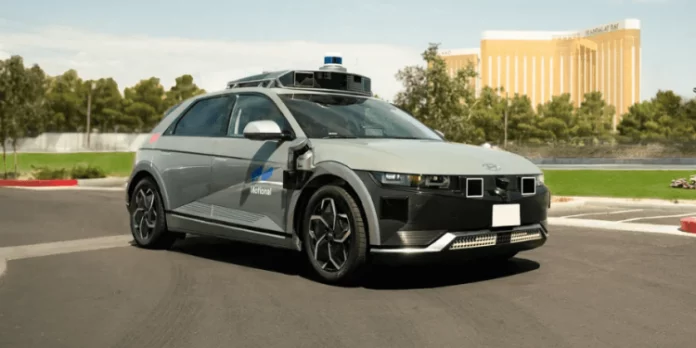By: Nick Gambino
Lyft has partnered with Motional to launch a new autonomous vehicle robotaxi service in Las Vegas. They’ve been testing these vehicles for several years, but this is the first official public launch of the driverless service.
If you’re in Vegas and hail one of these autonomous vehicles, an all-electric, modified Hyundai Ioniq 5 will pull up. Now all you have to do is take a deep breath and get in. To assuage your fears, the car has over 30 sensors, relying on lidar, radar and cameras to navigate the roads. You’ll be able to open the car doors with your Lyft app and begin your ride by engaging with the fitted display in the back seat. This is also where you’ll contact a remote Lyft/Motional agent if needed.
One of the reasons we’re seeing the public launch of the service, despite all the kinks not yet ironed out, is that it’s not 100% driverless. There is a human driver and a fellow operator up front, both prepared to take over if necessary. We’re not quite up to fully human-less cabs just yet.
Though, that future isn’t far off as both Lyft and Motional have stated their intention to launch a fully driverless robotaxi service in Sin City by next year. This is a big step forward for robotaxis and quite unlike anything we’ve seen from other ventures of this ilk. It’s not simply a beta where riders have to sign an NDA. This is a publicly launched service. And what’s more, it’s free.
“The service is open to the public,” Vice President of Commercialization for Motional, Akshay Jaising, wrote in an email announcing the launch. “Any Lyft rider in Las Vegas can request a Motional AV[autonomous vehicle]. No NDAs. No sign-ups. That’s how Motional and Lyft have operated for the past four years. We believe the best feedback is from real riders, not employees or limited participants.”
One of the reasons Lyft has been able to fast-track this program, leaving other competitors in the dust, is because they’ve chosen to partner up with other companies to bring in autonomous vehicles instead of creating their own. These other companies want a platform to show off their cars and Lyft wants cars to offer on their platform. It’s a win-win.






